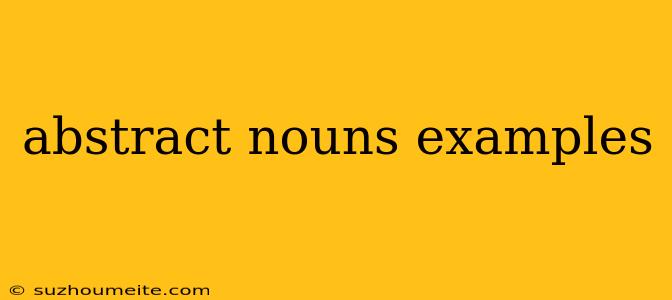Abstract Nouns: Examples and Explanation
Abstract nouns are words that refer to concepts, qualities, feelings, or ideas that cannot be physically touched or seen. They are intangible and often represent something that exists in our minds or in our understanding of the world.
Here are some examples of abstract nouns categorized by their general meaning:
Concepts:
- Justice: The principle of fairness and equality.
- Freedom: The power or right to act, speak, or think as one wants without hindrances.
- Peace: A state of tranquility and harmony.
- Democracy: A system of government where supreme power is vested in the people and exercised by them directly or indirectly through a system of representation usually involving periodically held free elections.
- Knowledge: Facts, information, and skills acquired through experience or education.
Qualities:
- Beauty: The quality of being pleasing or attractive.
- Honesty: The quality of being truthful and having strong moral principles.
- Courage: The ability to face danger, fear, or difficulty with bravery.
- Intelligence: The ability to acquire and apply knowledge and skills.
- Strength: The ability to exert power or force.
Feelings:
- Happiness: A state of well-being and contentment.
- Sadness: A feeling of sorrow or unhappiness.
- Love: A strong feeling of affection and care for another person.
- Fear: An unpleasant emotion caused by the threat of danger, pain, or harm.
- Anger: A strong feeling of displeasure or hostility.
Ideas:
- Hope: A feeling of expectation and desire for a positive outcome.
- Faith: Complete trust or confidence in someone or something.
- Inspiration: The process of being mentally stimulated to do or feel something, especially to create.
- Creativity: The ability to produce new and original ideas.
- Imagination: The faculty or action of forming new ideas or images in the mind.
Identifying Abstract Nouns
To identify an abstract noun, ask yourself:
- Can I touch it? If the answer is no, it might be an abstract noun.
- Does it represent a concept, quality, feeling, or idea? If yes, it's likely an abstract noun.
- Does it exist independently of concrete things? If yes, it's an abstract noun.
Remember that abstract nouns are important for expressing complex ideas and emotions. By understanding these concepts, you can communicate more effectively and expand your vocabulary.
